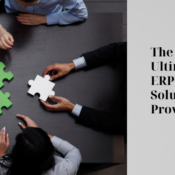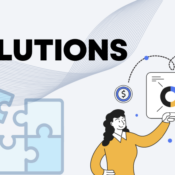Benefits of Cloud ERP Solutions for Modern Businesses

12/18/2023
/
Benefits of Cloud ERP Solutions for Modern Businesses
The world is changing faster than ever, and businesses need to keep up with the pace of innovation and disruption. To survive and thrive in the digital economy, businesses need to be efficient and customer-centric. They need to have access to real-time data, streamline their processes, and adapt to changing market conditions. They need to use the power of the cloud. Cloud ERP has many benefits.
Cloud ERP Solutions is a game-changer for modern businesses. It is an enterprise resource planning system that runs on a vendor’s cloud platform rather than on-premises servers. It allows you to access and manage your core business functions, such as finance, accounting, supply chain, procurement, production, fulfillment, human resource management, inventory management, and sale management, over the Internet. Cloud ERP offers many benefits to modern businesses, such as continuous innovation, lower costs, simplicity and automation, new functionality, scalability, and security.
In this blog, we will explore the benefits of cloud ERP for modern businesses.

Benefits of Cloud ERP Solutions for Modern Businesses:

Lower Costs:
Cloud ERP eliminates the need for upfront capital expenditure on hardware and software licenses, as well as ongoing maintenance and support costs. Businesses pay only for what they use and can scale up or down as needed. Another benefit of cloud ERP is that it reduces the burden on IT staff, who can focus on more strategic initiatives rather than managing applications.New Functionality:
Cloud ERP solutions provide access to advanced technologies that are otherwise difficult to apply on-premise, such as artificial intelligence (AI), the Internet of Things (IoT), machine learning, analytics, and blockchain. These technologies enable businesses to enhance their performance, efficiency, accuracy, and customer experience. For example, AI and MI can help with inventory optimization, fraud detection, and personalized recommendations. IoT can help with product tracking, quality control, and predictive maintenance. Blockchain can help with traceability, security, and trust. Analytics can help with data visualization and insights.Scalability:
Cloud ERP can easily accommodate changes in business size, volume, complexity, or geography. Businesses can add or remove users, modules, features, or storage as needed. They can also expand into new markets or regions without having to invest in additional infrastructure or resources. Cloud ERP can handle peak-demand periods without compromising performance or availability.Security:
Cloud ERP vendors invest heavily in ensuring the security of their cloud platforms and applications. They use encryption, firewalls, backups, disaster recovery plans, and compliance standards to protect their customers’ data and privacy. They also offer various security features and options, such as role-based access control, multi-factor authentication, audit trails, and encryption keys. Businesses can also customize their security settings and policies according to their needs and preferences. Cloud ERP vendors also monitor and update their systems regularly to prevent and mitigate any potential threats or vulnerabilities.Automation and Simplicity:
Cloud ERP solutions simplify and standardize the IT landscape by consolidating disparate legacy systems and integrating with other cloud applications. It also automates manual and repetitive tasks, such as data entry, reconciliation, reporting, and compliance. This frees up time and resources for more value-added activities, such as analysis, decision-making, and innovation.Continuous Innovation:
Cloud ERP solutions vendors deliver new functionality and application improvements to all customers through regular updates and releases. Businesses can take advantage of the latest features and best practices without having to wait for costly and time-consuming upgrades or customizations. Cloud ERP also enables businesses to experiment with new business models and processes and introduce new capabilities that support their growth and differentiation.Accessibility and Teamwork:
Cloud ERP solutions make it easy for your team to access important business information and tools from anywhere they have an internet connection. This means that your employees can work from different places, like the office, their homes, or while traveling. This accessibility helps your team work together better and allows for more flexible work arrangements, which can make your employees happier and more productive. So, no matter where they are, cloud ERP ensures that your team can get the information they require.Getting Ahead in Business:
In today's super-competitive business world, it's really important to be better than your competitors. Cloud ERP solutions help with that by giving you access to the latest and most advanced technology and ideas. They keep your business up-to-date with regular improvements and new things to use. This helps you stay at the forefront of what's happening in your industry and makes it easier to change when your customers want something new. In simple terms, it helps you stay ahead of the competition.Conclusion:
Cloud ERP software solutions are an amazing tool for modern businesses. There are many benefits to cloud ERP, like making it easier to grow and change, saving money, and letting people work together better. Using cloud ERP is not a choice anymore; it's something businesses need to do to succeed in today's world. So, whether you're a small startup or a big company, cloud ERP can help you do better and go higher in the business world.Recent Posts
Monika Narriya/0 Comments
Why are ERP solutions important in the education sector?
Monika Narriya/0 Comments
Which is the best ERP solution provider company?
Monika Narriya/0 Comments
How do we select the right ERP solution for our businesses?
Sumit Kumar/0 Comments
9 Most In-Demand Programming Languages for 2024
Sumit Kumar/0 Comments
Best Time to Post on Social Media – 2024 Guide
Sumit Kumar/0 Comments
Why You Should Consider Semantic HTML for SEO
All Categories
- Bing
- Blockchain
- Blog
- Branding
- Case Study
- Content Marketing
- Conversion Rate Optimization
- Cryptocurrency
- Digital Currency
- Digital Marketing
- Email Marketing
- ERP Solutions
- Facebook Marketing
- Google Ads
- Google Updates
- Graphic Designing
- Hire Developers
- Image SEO
- Influencer Marketing
- IT
- Local SEO
- Machine Learning
- Mobile Application Development
- Pay Per Click
- Pinterest SEO
- Podcast Hosting
- React JS
- Reddit & Quora
- Search Engine Optimization
- SEO Copywriting
- Social Media Marketing
- Software
- Software Development
- Technology
- UX and UI
- Web Designs
- Web Hosting
- Website Development
- Website Redesigning
- YouTube SEO








